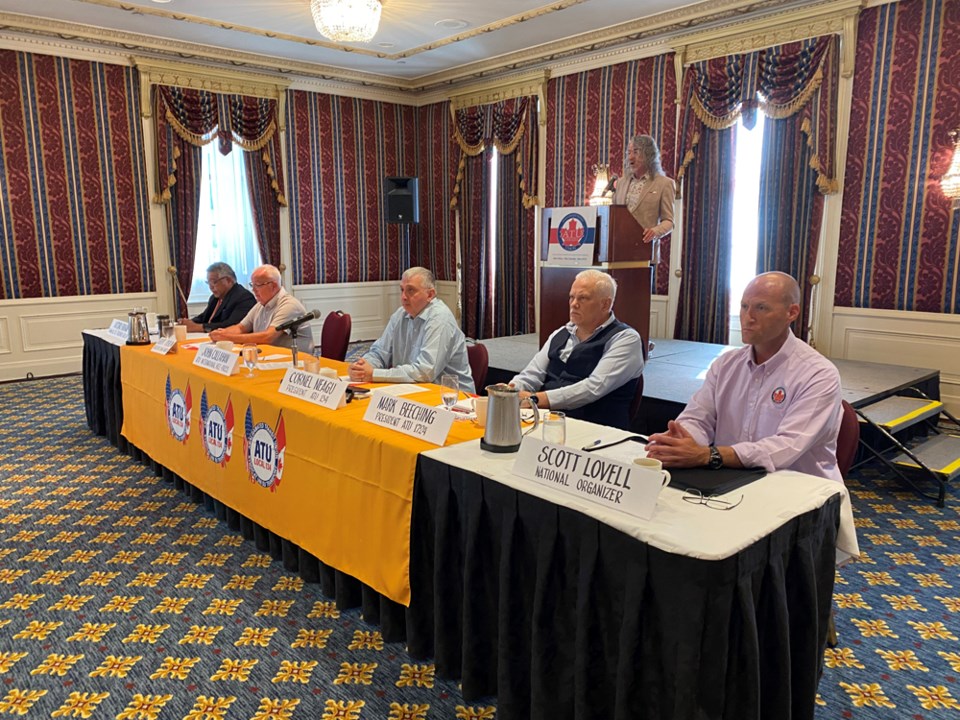Blue Bus drivers and mechanics have issued 72-hour strike notice following a breakdown in contract negotiations with District of West Vancouver.
The Amalgamated Transit Union local 134’s 150 members voted 99 per cent in favour of job action on Tuesday (July 19). The ATU’s leadership announced the following day that their members will stop all overtime work, as of Saturday at 1 p.m., and employees will report to work wearing their union T-shirts, not their uniforms.
At issue in the labour dispute are wages for the 40 shuttle bus drivers in the union and guaranteed break times written into the schedule following each complete run.
The ATU says TransLink’s Coast Mountain Bus Co. shuttle drivers are paid $3.30 more per hour than Blue Bus shuttle drivers.
“They're doing the exact same work. It doesn't make sense,” said John Callahan, ATU International vice-president.
Guaranteed scheduled breaks are a “strike issue” for the members because it’s a matter of health and safety, and because they are the ones who catch the brunt of frustrations from passengers when the buses get behind schedule, Callahan added.
“Scheduling is so tight, that there's no time for the operators to get out of the seat at the end of the line, stretch their legs, and use the bathroom. This is ridiculous that we should have to bargain that. That's a basic human right,” he said.
Following the announcement, the district issued a statement saying they were “disappointed” to learn of the vote results and pending job action.
“The district has offered a fair deal, including significant wage increases in line with Coast Mountain Bus Co.’s recent agreement, and measures to address the working condition concerns identified by the union,” said district spokesperson Donna Powers.
That offer included a five-per-cent raise for skilled trades, three per cent for other transit employees and a greater increase for the shuttle bus drivers, she said.
COVID-19 an issue
In the short term, the ban on overtime may impact West Van residents hoping to get to and from Vancouver for the Celebration of Light fireworks on Saturday, for which TransLink has been staffing up.
Of greater concern is that overtime is also used when drivers or other staff call in sick, something that may impact whether buses are running on time, as the seventh wave of COVID-19 rolls through B.C., Powers said.
“As we are aware, we are in a pandemic still and that’s a very real factor at play here,” she said.
The union’s contract with West Vancouver expired in March. The two sides have not been in negotiations since June 15.
Local 134 president Cornel Neagu said he apologizes in advance to North Shore commuters who rely on the Blue Bus for any service disruptions, but added it now falls to the district to come back with a better offer.
“Everything is on the table at this moment, but we don't want to go on full strike yet,” he said. “If the employer is not willing to come back and bring a fair deal to us and discuss that, then we're going to have no other choice and to escalate it.”
West Vancouver's statement contends it was the ATU that left negotiations without a counter offer and that the municipality is prepared to resume bargaining at any time.
Service on the 257 route, which provides express service between the BC Ferries terminal at Horseshoe Bay and downtown Vancouver will not be impacted as it was transffered from the Blue Bus to TransLink in 2018.
Those appearing at the announcement in support of the union included West Vancouver mayoral candidate Mark Sager and transit user Lorna Beallie, who has been a Blue Bus passenger for 58 years.
“The drivers, they're all just family to me, and we treasure them,” Beallie said. “What will this 88-year-old do if I can’t get out twice a day on my Blue Buses?”
The Blue Bus is the last municipally owned bus service in operation under TransLink. Its staff are District of West Vancouver employees and are represented by a different union than those in the TransLink system.
The Blue Bus carries about 18,000 passengers per day.



